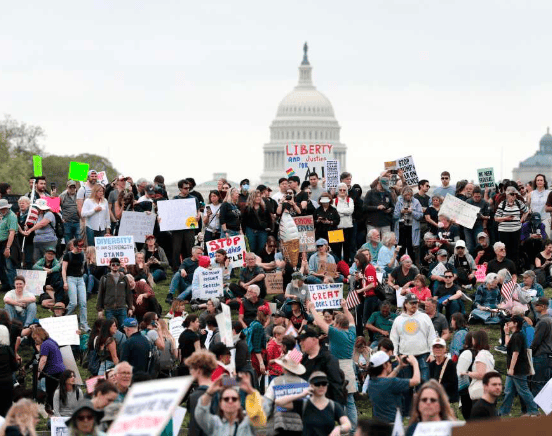Washington, DC erupted in protest this weekend as several thousand residents took to the streets to oppose President Donald Trump’s deployment of National Guard troops in the capital. The demonstration, branded the “We Are All D.C. March,” highlighted widespread anger over what many view as an unconstitutional occupation of the city.
Chanting “Free DC” and “Resist Tyranny,” protesters gathered near the U.S. Capitol Building before marching through downtown. Organizers said the rally drew support from undocumented immigrants, advocates for Palestinian statehood, and local activists opposed to Trump’s sweeping federal crackdowns.
“We’re opposing the authoritarian regime, and we need to get the federal police and the National Guard off our streets,” said Alex Laufer, a D.C. resident.
Why Trump Deployed the National Guard in Washington, DC
President Trump ordered the troop deployment last month, citing concerns over crime in the nation’s capital. He argued that sending in thousands of National Guard members, along with additional federal agents including ICE personnel, was necessary to “re-establish law, order, and public safety.”
The order also placed the Metropolitan Police Department under direct federal control—a move city officials say strips Washington of its right to self-govern. The D.C. National Guard is unique in that it answers directly to the president, unlike state-based guards that report to governors.
Despite Trump’s claims, Justice Department data shows violent crime in Washington hit a 30-year low in 2024. Opponents of the deployment say the president is using public safety as a pretext for consolidating federal power in Democratic-led cities.
Legal Showdown: Washington Sues Trump Administration
The protests coincided with a major legal challenge. Washington, D.C. Attorney General Brian Schwalb filed a lawsuit this week seeking to block the troop deployment. The suit argues that Trump’s order violates both the Constitution and federal statutes governing the use of military force in civilian areas.
“This is about more than just Washington,” one protester, who gave her name as Casey, told reporters. “If they can occupy the capital and people accept it, they’ll roll it out in more and more cities. We have to stop it here.”
The Chicago Connection: Trump Threatens More Deployments
Fueling further outrage, Trump suggested he would extend his National Guard strategy to Chicago. In a controversial post on Truth Social, the president shared an AI-generated image of himself dressed as a military officer from the film Apocalypse Now, declaring:
“I love the smell of deportations in the morning. Chicago about to find out why it’s called the Department of WAR.”
Illinois Governor J.B. Pritzker quickly pushed back, calling the threat “dictatorial” and warning of a coming legal battle. He also confirmed reports that military vehicles and additional ICE agents were being prepared for deployment in Illinois.
Divided Opinions Among Washington Residents
While thousands marched in protest, not all residents oppose the troop presence. Some D.C. community members in higher-crime neighborhoods expressed support, pointing to declines in carjackings and violent incidents since the surge began.
Mayor Muriel Bowser, a Democrat, has walked a careful line. She welcomed the increased presence of federal law enforcement but publicly stated she hopes the National Guard mission ends soon. On Friday, she signed an order requiring city agencies to coordinate directly with federal personnel.
More than 2,000 troops from six Republican-led states are currently patrolling Washington, focusing heavily on downtown and tourist areas. The Army recently extended the D.C. National Guard’s orders through November 30, suggesting the deployment could stretch into the holiday season.
A Battle for the Future of Federal Power
For many in Washington, the protests are not just about local policing—they are about democracy itself. Critics say Trump’s troop deployment in D.C., coupled with his threats toward Chicago and other Democratic strongholds, represents a test of how much federal overreach Americans are willing to tolerate.
“This isn’t just about crime numbers,” said protester Alex Laufer. “It’s about whether we accept a president using military force to occupy cities that don’t vote for him.”
As lawsuits move forward and demonstrations continue, the standoff between the White House and Washington residents underscores a deeper struggle over civil liberties, local self-governance, and presidential power. With the National Guard mission extended and Trump doubling down on his rhetoric, the conflict shows no signs of easing.
The Gold standard for AI news
AI keeps coming up at work, but you still don't get it?
That's exactly why 1M+ professionals working at Google, Meta, and OpenAI read Superhuman AI daily.
Here's what you get:
Daily AI news that matters for your career - Filtered from 1000s of sources so you know what affects your industry.
Step-by-step tutorials you can use immediately - Real prompts and workflows that solve actual business problems.
New AI tools tested and reviewed - We try everything to deliver tools that drive real results.
All in just 3 minutes a day



